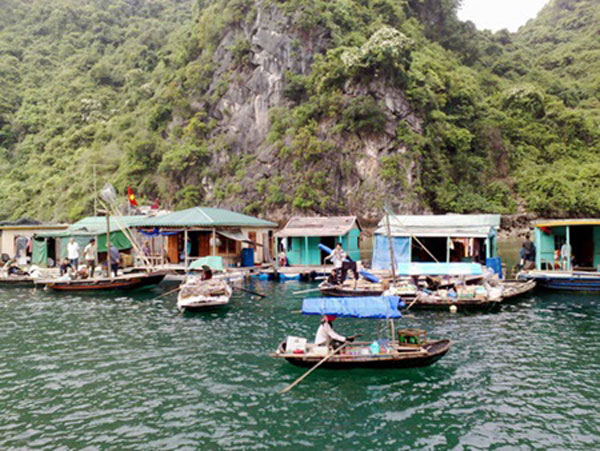
According to the Bay Management Board, some households were allocated resettlement houses but still came back to live on their houseboats. Other Ha Long bay occupants are households that already have houses inland and those who are not registered as city residents.
Last year, authorities of Ha Long City moved 364 houseboats on Ha Long Bay to new resettlement areas to tackle the worsening pollution situation at the UNESCO world heritage site.
 |
|
Last year, authorities of Ha Long City moved 364 houseboats on Ha Long Bay to new resettlement areas to tackle the worsening pollution situation at the UNESCO world heritage site. — Photo baoxaydung |
These houseboats not only do aquaculture activities but also provide unofficial tourism services such as selling seafood products to tourists.
Local authorities set up inspection teams to check the houseboats' operations. Recent inspections found that most of the households do not have licences to do seafood trading.
A member of the Provincial Market Watch department, Nguyen Trung Thanh, said provincial authorities temporarily banned tourism companies from making trips to houseboats in 2013, but many tourists are still taken there to visit and buy seafood products.
Overcharging at some houseboats had caused concern amongst tourists and negatively affected Ha Long city's tourism prestige. Local authorities therefore felt forced to temporarily ban tourist companies from including houseboats in their itineraries, he said.
However, only the tourist companies could be fined for violations of the ban; owners of houseboats couldn't be fined because of a lack of regulatory authority, he added.
Head of the management board, Pham Thuy Duong, said seafood business by these houseboats were done spontaneously and without State oversight.
Carrying out inspections and punishing violators remained difficult, making the problematic situation drag on for a long time, she said.
Le Thi Luyen, who has owned an aquaculture farm on the bay since 2000, said she expected that the local authorities would soon plan to zone off an aquaculture area to create stable jobs for local residents.
Luyen recently moved her operations from a location in Ba Hang to Hoa Cuong, both of which are in the bay, in hopes to make bigger profits. However, she said, she's concerned that if aquaculture breeders were not allowed to sell seafood products to tourists, then breeders would suffer.